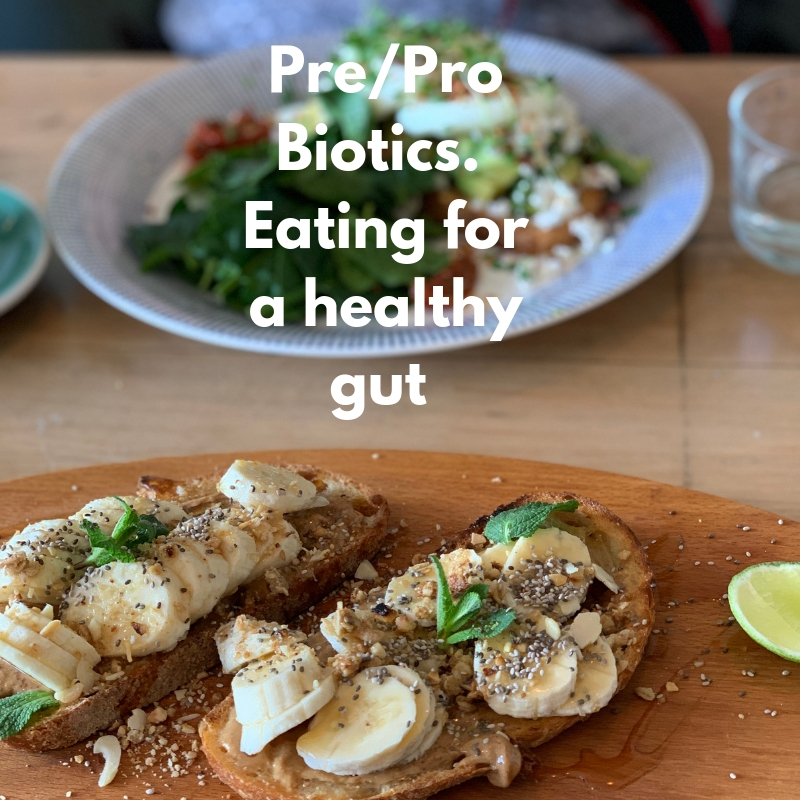PRE/PROBIOTICS – EATING FOR A HEALTHY GUT
Huge thanks to Melissa Kuman for this guest blog. Melissa is a Registered Associate Nutritionist. She can be found on instagram or check out her blog.
TOP FACT! Can you believe that the bacteria inside us can weigh up to 2kg and around 10% of what we eat feeds them?
In a nutshell, you can improve your gut by eating certain prebiotic foods and/or take probiotics. This is important as a lot of our immunity is dependent upon our gut (70% of the immune cells are located in the gut) and the microbes that live in it. Plus, 90% of serotonin, the happy hormone is produced in the gut. So basically good nutrition = healthy gut= serotonin and immune system= happy mind and body! Now lets get into this in a bit more detail…

What is the difference between pro and prebiotics?
Great question! Well probiotics are live microorganisms that, when administered in adequate amounts, confer a health benefit on the host FAO/WHO (2002). Where as prebiotics are certain fibrous foods (like banana, onions and oats) that help feed the bacteria.
What do probiotics do?
Probiotics rarely colonize in the gut, but rather intermingle with microbes there. As they go through the gut, they interact with gut cells, immune cells and food, giving their benefits. There’s so much research talking about the benefits of probiotics! Studies show that probiotics can improve digestive health and our immunity, including: decreasing antibiotic‐linked diarrhoea; improving resilience to infections; and improving digestion of lactose. There is even some early evidence of benefits in weight management and glycaemic control, depression and anxiety (Jacka 2017).
There’s no harm in taking probiotics but they’re quite expensive, so you could go for prebiotic foods that help feed the good bacteria like oats, bananas, onions, greek yoghurt and Kombucha.
It is important that the probiotics you are taking have research on the certain bacteria they include and that a health benefit has been proven.
Prebiotics
Prebiotic foods are fibrous foods but not all fibrous foods are prebiotic, see table below. Overall, we need 30g of fibre a day and on average, in the UK, we are consuming just 18g. Both observational and interventional studies show that fibre influences gut health. As Burkitt, 1972 said ‘Dietary fibre has a role in the prevention of certain large bowel and other diseases present in Western countries’. Prospective studies also show it can decrease the risk of bowel cancer and insulin resistance in type 2 diabetes.
So how can we increase our fibre? Why not try eating more nuts and seeds and whole fruit and vegetables. For example you could add banana onto your morning cereal and make a big pot of vegetable curry with whole grain rice.
Interestingly Tim Spector, Professor of Genetic Epidemiology at King’s College London followed his son’s ‘Fast Food Diet’ to investigate the changes in the microbiota over the 10 day period. Tim ate 2 x Large McDonalds Meal [Big Mac/chicken nuggets, fries & Cola], 1 packet crisps & 2 beers for 10 days. After the 10 days, he lost nearly 40% of bacterial species with the good bacteria diminishing. Tim felt constipated, tired and grumpy. Not surprising really.
Other factors influencing the gut
‘Exposure to stress, both physical and psychological can modify the composition of the microbiota, due to increased permeability of the gut, allowing opportunistic bacteria to grow and potentially cause damage.’ Rhee et al. (2009).
It is important to put a bit of self-care into your day to reduce stress like running a bath and to be mindful when eating. Both these can help you have a happy gut.
| Prebiotics | Probiotic |
| banana | Yakult- Lactobacillus casei shirota |
| chicory | Codex- Saccharomyces Boulardii |
| onion | Actimel- Lacobacillus Casei |
| asparagus | Mutaflor- Escherichia Coil Nissle |
| garlic | Dicoflor- Lactobacillus rhamnosus |
| leeks | Tempeh |
| Cocoa | Kimchi |
| Flaxseeds | Miso |
| Artichoke | Kombucha |
| Barley | Live yoghurt |
| Oats | Kefir |
| Apples | Sauerkraut |
References
Heiman ML, Greenway FL. A healthy gastrointestinal microbiome is dependent on dietary diversity. Mol. Metab. 2016;5(5):317-320. doi:10.1016/j.molmet.2016.02.005.
Rhee et al. (2009) Nat Rev Gastroenterol Hepatol; 6: 306-314. 14.
Hooper B, Spiro A, Stanner S. 30g of fibre a day: An achievable recommendation? Nutr. Bull. 2015;40(2):118-129. doi:10.1111/nbu.12141.
https://theconversation.com/your-gut-bacteria-dont-like-junk-food-even-if-you-do-41564
Jacka BMC Med 2017 ‘A randomized controlled trial of dietary improvement for adults with major depression’
FAO/WHO (2002) updated Hill et al (2014) Nature Rev Gastro Hepatol